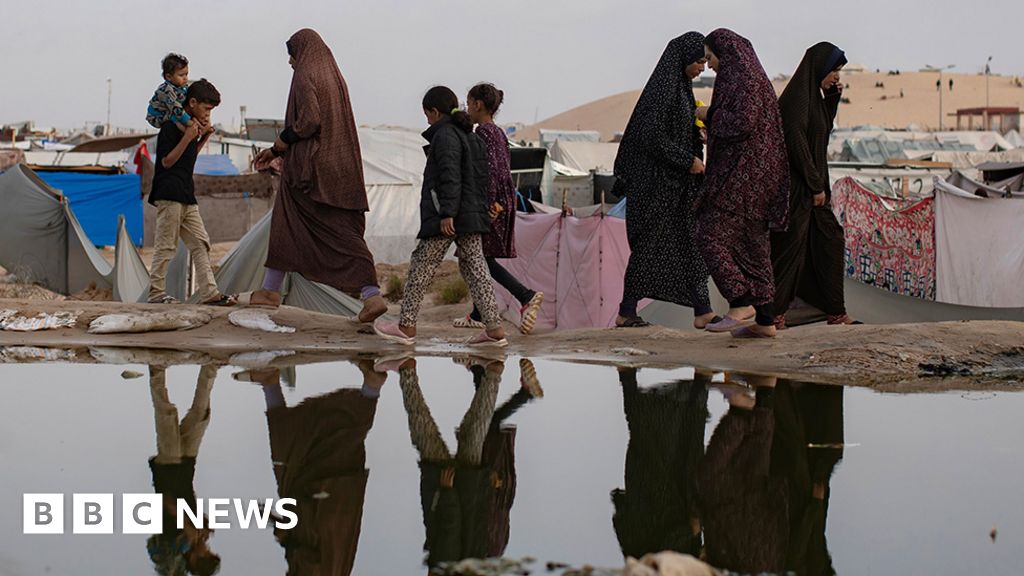
Palestinian President Mahmoud Abbas said that the United States is the only country that can prevent Israel from attacking the city of Rafah in the southern Gaza Strip, where more than a million people are seeking refuge.
Abbas, who administers parts of the occupied West Bank, said any attack could lead to Palestinians fleeing Gaza.
Israel has constantly threatened to carry out an attack in Rafah.
US President Joe Biden confirmed his “clear position” on Rafah to Israeli Prime Minister Benjamin Netanyahu in a phone call on Sunday.
The United States has repeatedly said that it cannot support a large-scale Israeli military operation in Rafah without seeing a credible plan to keep civilians out of harm's way.
Speaking at the World Economic Forum in the Saudi capital, Riyadh, earlier, Abbas – whose Palestinian Authority does not exist in Gaza, which has been under Hamas rule since 2007 – urged the United States to intervene.
He said, “We call on the United States of America to ask Israel to stop the Rafah operation because America is the only country capable of preventing Israel from committing this crime,” adding that only a “small strike” on Rafah would force the Palestinians to do so. Residents flee the Gaza Strip.
“Then the greatest catastrophe in the history of the Palestinian people will occur.”
More than half of Gaza's population lives in Rafah, and conditions in the densely populated southern city are already bad, with displaced people there telling the BBC that there are shortages of food, water and medicine.
While the White House did not clarify what Biden's recent comments to Netanyahu specifically were regarding the planning of the attack in Rafah, national security spokesman John Kirby told ABC that Israel had agreed to listen to American concerns and ideas before entering.
US Secretary of State Antony Blinken arrived in Riyadh where he will hold talks with Mr Abbas at the start of a new tour in the Middle East.
On the other hand, the indirect negotiations between Israel and Hamas regarding a possible ceasefire and the release of the remaining hostages in Gaza, which have gained new momentum recently, have revealed more divisions within the ruling coalition in Israel.
War Cabinet member and opposition figure Benny Gantz said on Sunday that the current government “will not have the right to continue to exist” if a reasonable deal to return the hostages is not accepted.
Gantz wrote on X, previously Twitter, “The entry of Rafah is important in the long struggle against Hamas. The return of our abductees is urgent and of much greater importance.”
However, far-right Finance Minister Bezalel Smotrich said that the government must resign if it accepts an agreement to cancel the planned attack in Rafah.
Their comments come after Israel's foreign minister said his country could suspend the incursion, which Netanyahu said was the next step in its fight against Hamas, if a hostage deal is reached.
The Israeli army said that its commander, Herzi Halevy, had approved plans to continue the war, and Israeli media said this referred to the Rafah operation.
The long-running talks brokered by Egypt and Qatar have faltered largely over gaps between the positions of Israel and Hamas, but Hamas said on Sunday it would send representatives to Cairo to respond to the latest proposal.
American media quoted unnamed Egyptian officials as saying that the latest ceasefire proposal presented to Hamas includes a period of calm for several weeks aimed at ending the war, in exchange for the release of 20 hostages.
Hamas wants a permanent end to the war and the withdrawal of all Israeli forces from Gaza, while Israel insists on the need to destroy Hamas in Gaza and release all hostages.
Egypt and other Arab countries have previously said that the influx of Palestinian refugees fleeing the war would be unacceptable because it would amount to the expulsion of Palestinians from their lands.
Satellite images showed new tent camps being built near the Gaza coast, west of Rafah, and the city of Khan Yunis slightly to the north, which were largely left in ruins. Media reports say that the tents are intended to shelter displaced people from Rafah.
The current war began when Hamas attacked Israeli communities near Gaza, killing about 1,200 people, most of them civilians, and taking about 250 hostage. It is believed that about 133 hostages remain in Gaza, including about 30 dead, after a short truce in November that saw some hostages released.
Israel's air bombing campaign and ground operations in Gaza since October 7 have killed 34,454 people, most of them civilians, according to the Hamas-run health ministry there.
Over the six months of the war, the IDF entered and took control of the entirety of northern Gaza, including Gaza City, and most of central and southern Gaza, including Khan Yunis.
It has since withdrawn from almost all of those areas, but forces are still stationed on the road that Israel built to separate northern and southern Gaza.
However, Palestinians displaced into southern Gaza – where the Israeli army had asked them to go for their safety earlier in the war – have been unable to return to their homes in the north, a key demand made by Hamas in ceasefire talks, and which Israel has not given. Yes i agree. An indication of when they will be allowed to do so.
Meanwhile, deadly Israeli bombardment continued across Gaza, including Rafah, where the Israeli military said it was hitting rocket launch sites.

“Travel specialist. Typical social media scholar. Friend of animals everywhere. Freelance zombie ninja. Twitter buff.”





More Stories
Macron rejects left-wing bid to appoint PM before Olympics
Dogs can smell human stress and make decisions accordingly, study says: NPR
Hamas and Fatah sign declaration to form future government as war rages in Gaza